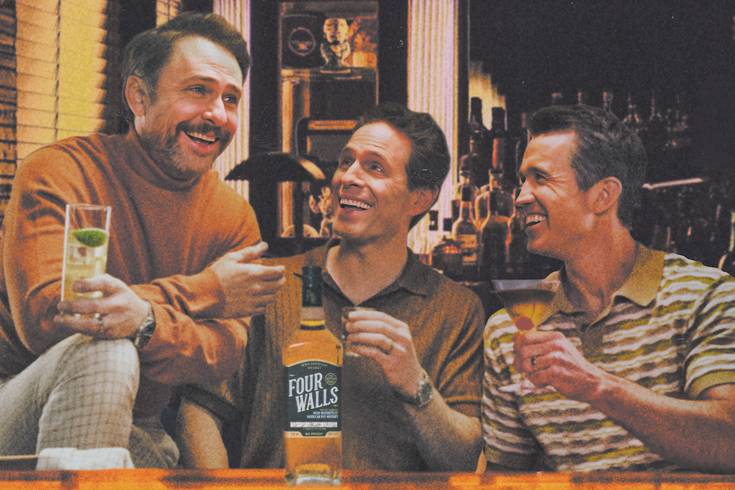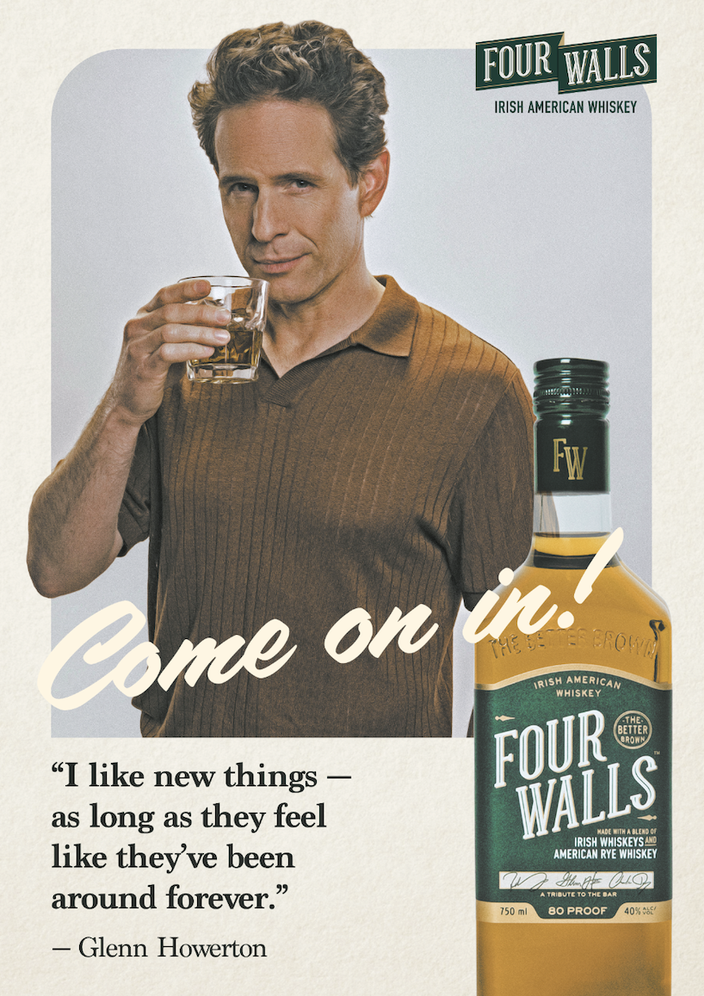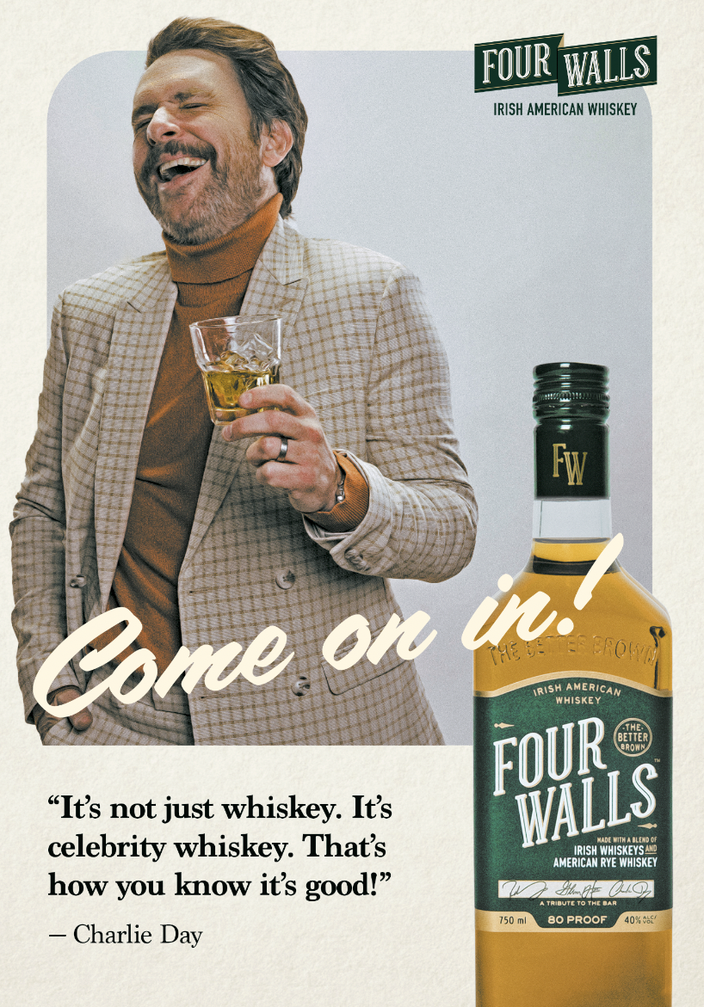
August 05, 2024
 Provided Image/Four Walls Whiskey
Provided Image/Four Walls Whiskey
Four Walls, an Irish-American whiskey, was created in 2021 by 'It's Always Sunny in Philadelphia' stars (from left to right) Charlie Day, Glenn Howerton and Rob McElhenney.
During the throes of the COVID-19 pandemic in 2021, three of the stars of "It's Always Sunny in Philadelphia" decided to try their hands in the alcohol business — in real life.
If the four walls of Paddy's Pub were enough to give sanctuary to their zany sitcom — now entering its record-holding 17th season — then surely they could channel their debauched love for that environment into something that could be enjoyed at neighborhood bars.
MORE: Ohio brewery sues Pennsylvania over 'protectionist' rules that limit beer sales
"Our entire brand is about celebrating bars and bartenders because they've been the places and people that have been responsible for so many of the great stories that we tell on our show," Glenn Howerton, who plays sociopathic bartender Dennis Reynolds on "It's Always Sunny," said during a Zoom call about Four Walls, a blend of Irish whiskey and American rye.
The brand has been steadily expanding distribution since it debuted nearly three years ago as a charity label. This week, the Pennsylvania Liquor Control Board approved making Four Walls more widely available at Fine Wine & Good Spirits stores and at bars in Pennsylvania. In a state known for its archaic alcohol laws, the listing is a milestone that gives Four Walls solid footing in a market that's symbolic to the brand.
"I think (PLCB) wanted to make sure this wasn't a quick, in-and-out money play — that we actually were going to be involved, cared and gave a s--- about it," Howerton said. "And that it wasn't just a slap-your-name-on-it and put out a subpar product and expect for it to do well in Pennsylvania just because it's the state where our show takes place."
Howerton and his co-stars, Rob McElhenney and Charlie Day, cut a promo to appeal to whiskey drinkers and bar owners in Pennsylvania.
The three longtime friends have embraced Four Walls as a passion project, one they hope can give back to an industry that helped make them famous. They initially considered a few different possibilities.
"My idea was I wanted to do a beer — partly because I thought it was the anti-celebrity spirit brand move to make," Howerton said. "And also because of my own hangups and irritation with the IPA craze and my own theory that 50% of the people that drink IPAs don't even really like them that much. ... Initially I thought, what if we made Budweiser, but it was good?"
But with a keen taste for top-shelf whiskeys, Howerton said he felt more excited by the idea of perfecting a blend that's not commonly made. He and his co-stars wanted to pair Irish grain and malt whiskey — best enjoyed straight — with an American rye that would be a versatile liquor for cocktails, too.
"I kind of couldn't believe that wasn't a thing, considering how important specifically Irish-American culture is to the founding of our country," Howerton said. "I really liked the idea of creating something where we carve out a niche with something that didn't exist."
Glenn Howerton appears in an advertisement for Four Walls whiskey.
For months, the actors sampled various ratios of grain and malt whiskey sent to them from Ireland's Great Northern Distillery. They mixed the Irish blends with ryes initially from Pittsburgh's Wigle Distillery and later from Iowa's Cedar Ridge Distillery, where Four Walls is now blended.
"It was just a matter of making sure there wasn't a really good reason why there weren't other Irish-American whiskeys," Howerton said.
Satisfying his own ultra-refined tastes was a dilemma for Howerton. He really wanted to nail a blend that could be sold at an approachable price point — $36.99 for a 750 milliliter bottle — without compromising on quality.
"It might sound kind of s----y to say, but I was skeptical that we were going to be able to do that," Howerton said. "But we actually do it well. We're calling it the bartender's utility whiskey because we thought what's really cool about it is it sips and shoots like an Irish whiskey. If you're the kind of person who likes to have a shot of (Jameson) with your beer, you can do that with Four Walls because it's a very similar experience. But when you add that rye in there, all of a sudden it holds up in a cocktail better than other Irish whiskeys do."
The initial run of Four Walls included just 2,500 bottles of the Bartender's Blend Limited Edition — a 90-proof blended Irish and Straight Pennsylvania Rye — and 750 bottles of the Cask Strength Single Barrel Collector's Edition Irish whiskey that was aged in old bourbon barrels for more than 15 years.
All of the proceeds from that run went to a COVID-19 relief fund managed by the Pennsylvania Restaurant and Lodging Association. Howerton said Four Walls wanted to test the product in a way that would aid businesses crippled by public health closures.
"It was definitely not us wanting to jump into a celebrity liquor brand. As a matter of fact, that was one of the things that we didn't like about it — the idea of being associated with being another celebrity alcohol brand," Howerton said. "We've actively tried to satirize that. If we're saying we're a brand that cares about bars and bartenders, what better way than to literally put your money where your mouth is?"
Charlie Day mocks the celebrity spirit brand trend in an ad for Four Walls whiskey.
The feedback Howerton and the Four Walls team got from the first run encouraged them to move ahead with a full-scale whiskey label, one that could eventually be stocked at bars and stores across the country. Four Walls' triple-distilled, 80-proof, Irish-American Rye blend is now sold in Pennsylvania, New York, California, Florida, New Jersey, Maryland, Delaware and Washington, D.C. It's also available online to be shipped to 40 other states.
Howerton and the Four Walls team have been touring bars in multiple states to promote Four Walls. At Mac's Tavern in Old City — part-owed by McElhenney and Kaitlin Olson — the brand had a trivia night on Sunday and at bars in four other cities to mark the 19th anniversary of "It's Always Sunny in Philadelphia." Four Walls events have created chances to connect directly with bar staff and patrons.
"I've been spending a lot of time getting behind the bar and pouring shots for people. I'm not very good at making cocktails, so I shut people down when they try to get me to make them a cocktail," he said. "It's beautiful to see the level of support that we have in the bartending community. I didn't know how popular our show is within the service industry in general, but definitely with bartenders. We're a bartender-led brand. That's the whole thing."
Howerton likens the marketing behind Four Walls to a "'70s throwback beer ad kinda vibe," which he credits to Four Walls CEO Casey McGrath. The brand's jingle refers to the whiskey as "the better brown," calling back to an era of distinctly Irish-American bars that still thrive in cities like Philly and Boston.
"There are Irish whiskey brands that celebrate a certain provenance and heritage in Ireland. There are American whiskey brands that celebrate a certain type in America. But Irish-American is not only the makeup of what's in the liquid. It's also the spirit of the brand," McGrath said. "There's a real American working-class story there that's celebrated in those bars in a really unique way."
The ambiance of those bars is now connecting with a new generation coming out of the pandemic years. Four Walls wants to be the whiskey associated with that backdrop.
"There's a nostalgia boom of going to the bar," McGrath said. "People are going to be looking for those bar experiences from the 1970s and '80s that they've seen in the shoebox with their parents' photo albums. We're there for that trend when it inevitably happens. People are always going to wander back to that warm, corner bar."
Four Walls also is capitalizing on McElhenney's connection to the Phillies and retired legend Chase Utley, who filmed a commercial with Four Walls that debuted at Citizens Bank Park in June. The stadium now sells a Four Walls and ginger ale cocktail called "The Man," paying homage to the moniker late broadcaster Harry Kalas gave to Utley.
Howerton said Four Walls has already exceeded his expectations. He doesn't think it's just because the whiskey is a celebrity venture, something "It's Always Sunny" joked about in an episode with "Breaking Bad" stars and tequila entrepreneurs Bryan Cranston and Aaron Paul. The brand works, in Howerton's view, because the whiskey is standing up to its billing in bars.
"It's definitely not a perpetual motion machine yet. There's lots of hard work to be done, but us and our team are happy to do it because we genuinely believe in the product," he said.
More than anything else, growing the business reminds Howerton of the joy he had years ago hanging out at Philly bars as he and his best friends embarked on a path to TV history.
"Especially in the early years of doing 'It's Always Sunny,' we spent nights out drinking at lots of places throughout the city," Howerton said. "That's become more complicated as the years have progressed and the popularity of the show progressed. That is the one thing you give up when you do a show about an Irish pub for 20 years. You give up the right to be able to go drink in said pub anonymously."
 Provided Image/Four Walls Whiskey
Provided Image/Four Walls Whiskey Provided Image/Four Walls Whiskey
Provided Image/Four Walls Whiskey